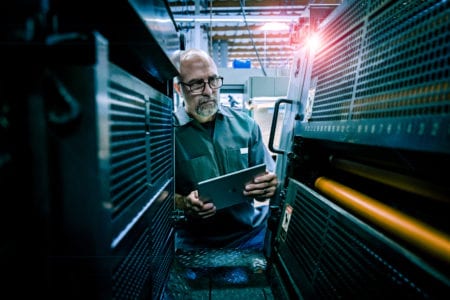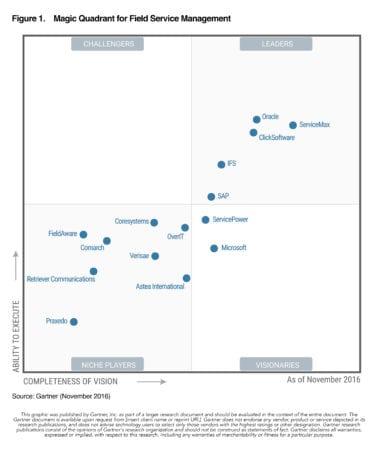The following is a guest blog from Mayfield Partner Rajeev Batra. Rajeev is an investor of ServiceMax and serves on the board of directors. Read his original post here.
Providing a great customer experience through superior service has been the hallmark of great businesses.
In today’s hyper competitive world, where product differentiation doesn’t last long and customers expect to be treated well, it is truer than ever before. Businesses must be service obsessed to survive and thrive, period. In many instances, service is the product (e.g. Netflix) or is core to keeping a product functioning (e.g. a car). At Mayfield, we have partnered with a number of entrepreneurs who are helping transform the customer experience and are maniacally focused on delivering a great service. These include companies such as Marketo that powers personalized marketing for businesses; Lyft that makes transportation more accessible, convenient and safer for consumers; and SolarCity that provides consumers and businesses affordable turn-key clean power. In the late 90s, when I was at Siebel Systems, we had created the leading service software platform but its appeal was narrow and limited by the lack of technologies we take for granted today such as the cloud and mobile.
As is the case for most innovations timing, is everything. So seven years ago, we started thinking about what an “operating system” for service-driven companies would look like.
Eighty percent of the US economy is services based and, even for traditionally non-service based manufacturing and industrial companies, the future is in services. While software and Internet of Things (IoT) is increasingly powering the next generation of consumer and commercial devices, machines, and systems, service is often delivered by field service technicians.
We know them as the guys and gals driving around in white vans, working hard in the field – locating, diagnosing, and fixing stuff. Often, they have to weather the elements outdoors or crawl through a subfloor to fix a hard-to-reach piece of equipment. While we take it for granted, it turns out each and every one of our lives is touched by technicians ensuring that the products and services we rely on are installed, maintained and repaired 24×7. These include our precious cable boxes so we can watch our favorite shows; HVAC systems to keep us hot or cool; the elevators we use so we can avoid stairs; the jet engines that ensure the planes we fly in keep flying; the MRI machines that are used to diagnose our illness. And the list goes on. 
So, what technology do the service technicians at all these companies use to ensure this stuff runs smoothly? It turns out, not much. Most use antiquated home-grown solutions, many still paper based, which are not only inefficient but incapable of delivering the types of services businesses want to provide and their customers want.
We realized, automating and managing the entire lifecycle of field-based service appeared to be a large and promising starting point for an “operating system” for service platform opportunity. Field Service Management (FSM) is a hard and complex problem to solve as it can vary by industry vertical, business model, the type of products a company sells, the technology readiness of the company, and type and frequency of services. And the timing seemed right: cloud-based software was a reality, SaaS as a business model was well suited for FSM, and mobile computing was finally here. Furthermore, the promise of Big Data and IoT offered to truly enable a melding of humans and machines to solve the problem in its fullest.
While we thought FSM was a lucrative market, it is not necessarily an exciting space for Silicon Valley entrepreneurs or VCs and it was not easy to find the right team to partner with. For us at Mayfield, founders always come first and we believe that they are the only true differentiation a startup has at the earliest stages.
The unique thing about ServiceMax, compared to many other SaaS companies, is that over time it becomes the lifeblood of a service-based business and is not just a nice to have but part of mission critical infrastructure.
And then we came across Dave Yarnold, Athani Krishnaprasad and Hari Subramanian at ServiceMax. All three of them had a deep understanding of field service and a vision for how to transform and re-imagine the service economy using a cloud and mobile platform. Athani and Hari were experts in the domain and had built a field service technology consulting business for over a decade. Dave had scaled multiple successful software companies in his career including, Clarify, a client/server era leader in the field service space and was instrumental in scaling and taking SuccessFactors public as it’s head of sales. Besides the unique domain expertise and company building skills, the team was deeply passionate about truly making a difference in the lives of field service technicians and customers. It was clearly the best team for the opportunity and we were fortunate to partner with them in 2011.
Five and a half years later, ServiceMax has grown into the leading platform for Field Service: an end-to-end suite of cloud-connected mobile applications to power the field service operations of some of the biggest companies in the world such as GE, Phillips, and Schneider. Increasingly, many companies are generating a larger portion of their profits from services and Service is now a key differentiator, not just a cost center. The ServiceMax platform is becoming a core fabric of Industrial IoT that is powered by Big Data and Analytics, which is now the digital exhaust of devices and machines.
The unique thing about ServiceMax, compared to many other SaaS companies, is that over time it becomes the lifeblood of a service-based business and is not just a nice to have but part of mission critical infrastructure. ServiceMax is the reference platform for the market with an ecosystem of over 40 partners, and acknowledged as THE Leader in the Gartner Magic Quadrant for Field Service Management.
part of mission critical infrastructure. ServiceMax is the reference platform for the market with an ecosystem of over 40 partners, and acknowledged as THE Leader in the Gartner Magic Quadrant for Field Service Management.
Dave, Athani and Hari are zealots about building a service oriented culture, which is embodied in the great team they have assembled, including folks like Scott Berg and Rick Gustafson. And it is weaved into the DNA of the Company in the way it treats its customers, partners and employees. Industry watchers have taken note and ServiceMax was named in the Forbes 2016 list of the next Billion Dollar Startups.
For me, it has been an amazing journey from the first time I saw the opportunity at Siebel Systems to partnering with ServiceMax. While the team could continue its mission independently, by aligning with GE Digital, ServiceMax has the opportunity to more rapidly accelerate its vision and empower the millions of field service technicians, many of whom are blue collar workers. I am also excited to see GE, “the original startup”, a great American Company, continue to accelerate its own transformation as a next generation software driven digital innovator.
I am truly happy for Dave, Athani, Hari and the entire ServiceMax team and family on this wonderful milestone. Congratulations and thank you for allowing me and Mayfield to be of service to you on this journey!


Share this: